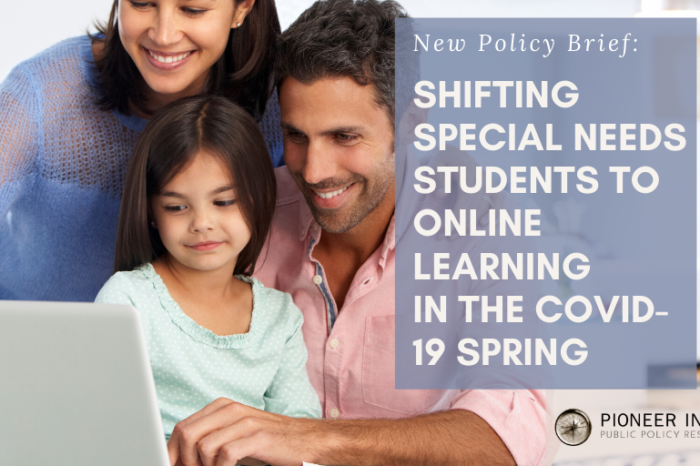Experts Find K-12 Online Education Can Be Appropriate for Most Special Needs Students
Key is teachers and parents working as a team
BOSTON – School closures due to COVID-19 have separated more than seven million K-12 special needs students from support they receive in the classroom, but online learning can be appropriate for most of those students if teachers and parents work as a team to provide each one with what he or she needs, according to a new report published by Pioneer Institute and ASU Prep Digital.
“Both special education teachers and parents of special needs students face unparalleled challenges right now,” said Julie Young, vice president of Education Outreach at ASU and managing director of ASU Prep Digital, who co-authored “Shifting Special Needs Students to Online Learning in the COVID-19 Spring” with William Donovan. “Teachers are leading teams with parents, while parents are often playing teacher and parent – all while working.”
In addition, special education teachers are often trying to develop plans for each student that fit within his or her Individualized Education Plan (IEP), determining if the online plans are working for students and adjusting to the use of online education tools.
Some special needs students, such as those with severe cognitive disorders, severe autism, or brain trauma, are unlikely to have their needs met by online education.
But online learning can work for most special needs students. It offers advantages such as the ability to slow the pace if students need more time to master material, and allows for movement breaks without disturbing others.
Success often depends on the school team’s approach and the presence of someone at home who can work with the student.
Communication is critical. Special education teachers should be in regular contact with families to do things like reviewing a child’s IEP by phone or video to ensure that parents are aware of particulars such as accommodations and modifications that make learning more likely and lessons more successful.
“Many parents need continuous guidance from teachers to ensure that they aren’t headed off in the wrong direction,” said Jamie Gass, director of education policy at Pioneer. “Teachers should check with them regularly to make sure they feel supported.”
Some problems can be exacerbated online. For example, many students have more distractions and more difficulty focusing at home. These problems can often be addressed by creating a list of daily activities that follow a similar order to the schedule students had at school, and using visual prompts or a kitchen timer that is reminiscent of a school bell.
Teachers should also assess whether assistive technologies students use at school – such as screen readers, where the computer reads whatever is on the screen to the student – are available at home. Going forward, such technologies should be written into the student’s IEP to ensure that they will be available across all settings.
Other creative ideas being explored to better serve special needs students remotely include home visits, localized neighborhood support, and partnerships with volunteers and community groups.
ABOUT THE AUTHORS
Julie Young is Vice President of Education Outreach at ASU and Managing Director of ASU Prep Digital. Julie is passionate about students and is focused on leveraging technology to provide them with new opportunities. Prior to joining ASU Prep Digital, she was the founding CEO and president of the Florida Virtual School, the world’s first virtual statewide school district and one of the nation’s largest and most influential K through 12 online education providers. During her tenure, the school served over 2 million students in 50 states and 68 countries.
William Donovan is a former staff writer with The Providence Journal in Rhode Island where he wrote about business and government. He has taught business journalism in the graduate programs at Boston University and Northeastern University. He received his undergraduate degree from Boston College and his master’s degree in journalism from American University in Washington, D.C.
ABOUT PIONEER
Mission
Pioneer Institute develops and communicates dynamic ideas that advance prosperity and a vibrant civic life in Massachusetts and beyond.
Vision
Success for Pioneer is when the citizens of our state and nation prosper and our society thrives because we enjoy world-class options in education, healthcare, transportation and economic opportunity, and when our government is limited, accountable and transparent.
Values
Pioneer believes that America is at its best when our citizenry is well-educated, committed to liberty, personal responsibility, and free enterprise, and both willing and able to test their beliefs based on facts and the free exchange of ideas.
Get Updates on Our Education Research
Related Content















